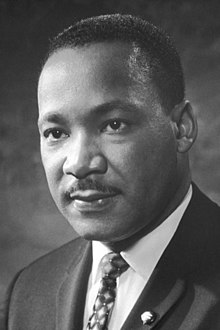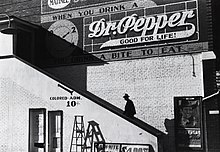
Civil Rights Movement
Starting in the late 1950s, institutionalized racism across the United States, but especially in the South, was increasingly challenged by the growing Civil Rights movement. The activism of African-American leaders Rosa Parks and Martin Luther King, Jr. led to the Montgomery Bus Boycott, which launched the movement.
Rosa Parks
For years African Americans would struggle with violence against them but would achieve great steps toward equality with Supreme Court decisions, including Brown v. Board of Education and Loving v. Virginia, the Civil Rights Act of 1964, the Voting Rights Act of 1965, and the Fair Housing Act of 1968, which ended the Jim Crow laws that Parks on a Montgomery bus on December 21, 1956, the day Montgomery’s public transportation system was legally integrated.
legalized racial segregation between whites and blacks.[183]
Martin Luther King, Jr., who had won the Nobel Peace Prize for his efforts to achieve equality of the races, was assassinated in 1968. Following his death others led the movement, most notably King’s widow, Coretta Scott King, who was also active, like her husband, in the Opposition to the Vietnam War, and in the Women’s Liberation Movement. There were 164 riots in 128 American cities in the first nine months of 1967. Black Power emerged during the late 1960s and early 1970s. The decade would ultimately bring about positive strides toward integration, especially in government service, sports, and entertainment. Native Americans turned to the federal courts to fight for their land rights. They held protests highlighting the federal government’s failure to honor treaties. One of the most outspoken Native American groups was the American Indian Movement (AIM). In the 1960s, Cesar Chavez began organizing poorly paid Mexican-American farm workers in California. He led a five-year-long strike by grape pickers. Then Chávez formed the nation’s first successful union of farm workers. His United Farm Workers of America (UFW) faltered after a few years but after Chavez died in 1993 he became an iconic “folk saint” in the pantheon of Mexican Americans.
Martin Luther King Jr. (born Michael King Jr., January 15, 1929 – April 4, 1968) was an American Baptist minister and activist who was a leader in the Civil Rights Movement. He is best known for his role in the advancement of civil rights using nonviolent civil disobedience based on his Christian beliefs.
Published: Feb 15, 2017
Latest Revision: Feb 15, 2017
Ourboox Unique Identifier: OB-248530
Copyright © 2017













